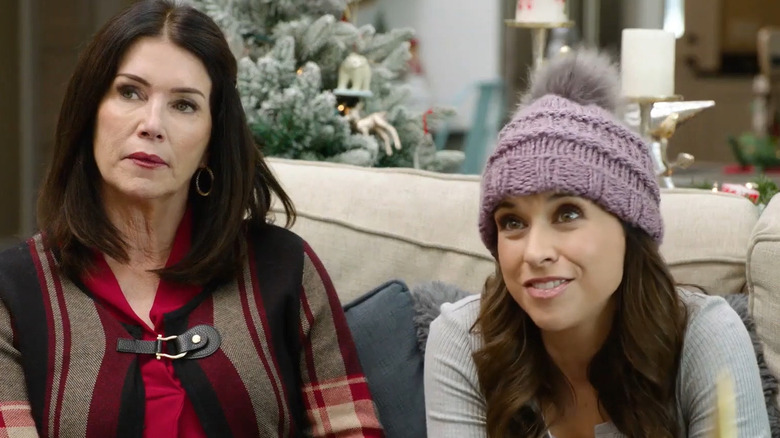Why People Love Hallmark Movies So Much, Explained By Science
Toward the end of every year, people can expect a cavalcade of Hallmark holiday movies to materialize. Dozens of festive films come out on the channel annually, with most of them following a pretty specific pattern. From "Saturday Night Live" to "The Simpsons," numerous outlets have parodied the formula of two people meeting around the holidays. They hate each other initially, but thanks to good, old-fashioned Christmas magic, they come to fall in love by the end. Bonus points if the lead woman originally has a boyfriend or fiancé who works too much, causing her to settle down with a man with traditional values.
The popularity of Hallmark movies may be odd to some, but science has actually weighed in to explain the phenomenon of why society is inundated with Hallmark holiday films every year. While there can be several factors at play, Pamela Rutledge, director of the Media Psychology Research Center and Media Psychology faculty at Fielding Graduate University, explained to NBC News that, ultimately, these films are relaxing and designed to decrease stress during an inherently stressful time of the year.
The holidays often bring financial turmoil and the stress of having to see family members you may or may not get along with. Hallmark movies take some of the edge off. They may not be intellectually stimulating, but that's a big part of the appeal.
Sometimes you want a burger over a steak
Hallmark movies may be filled with tropes, but Pamela Rutledge seems to think those patterns are ultimately what draw certain people in. She elaborated, "Those predictable story arcs that draw on the standard patterns we recognize from fairytales offer comfort by presenting life as simple and moralistic." Additionally, the (generally) poor acting and outlandish plots help emphasize the fact that these stories aren't real, allowing audiences to escape into another world and forget their troubles for a bit.
Rutledge even outlines ways to get the most out of your Hallmark viewing experience. For starters, viewers should be open to experiencing positive emotions, stating, "Positive emotions such as hope, happiness, the value of connection, appreciation and gratitude are very powerful." As such, people should be open to crying or laughing when appropriate. Hallmark movie staple Lacey Chabert even agreed with this assessment, saying how "goodness" and "hopefulness" make these films appealing.
Rutledge went on to explain how these movies can open people up to new possibilities and allow individuals to recognize what they value most. Of course, if Hallmark movies aren't for you, there's nothing wrong with changing the channel. Everyone consumes media differently, so while some people will watch every new Hallmark holiday movie that comes out, others can watch "Die Hard" and continue debating whether it's truly a Christmas movie.

